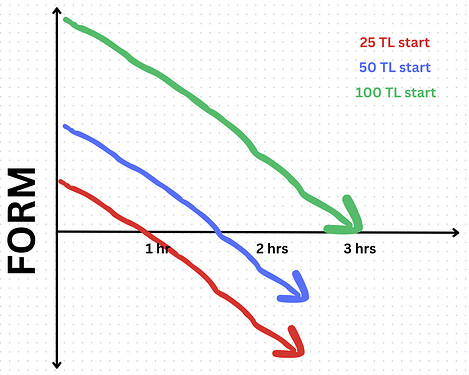That’s exactly one of the ways that we anticipated/hoped that people would do it - nice!
The final target TL will depend on the XSS of the event & your Event Readiness. Obviously you can complete that ride with a TL much lower than 171, which is why we added the ‘ER’ metric. There seems to be some discussion in cycling ‘Durability’, and this is how we can indirectly account for that.
If you want to read more to better understand this, you can expand below...
For an athlete with a TL of 25 (1-star) trying to do a multi-hour hard ride is going to leave them fatigued pretty quickly and likely red status for multiple days after. However, if you train more and reach a higher training status (say 50 or 100 TL), then you have more fitness to ‘buffer’ you from the effects of fatigue, if that makes sense. I’ve tried to sketch out what I mean below…
Vertical axis is form over time (as you ride), X-axis could represent time (or XSS) of your event. The longer the ride is (or more XSS it accumulates), it will cause your form to decrease. The higher your starting form is, the larger your ‘buffer’ is before you reach ‘tired/very tired’ status.
Also important to note that this concept applies to all 3 energy systems: Low, High, & Peak. If your event will put a lot of strain on your Peak Power system, then it would be advantageous to have a well-trained Peak system that can tolerate the repetitive strain - and in fact, could be to your advantage if other competitors don’t have High/Peak systems that are as well trained ![]()
